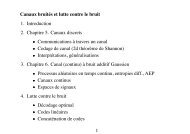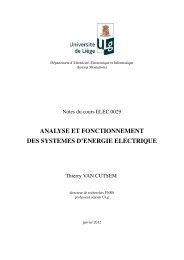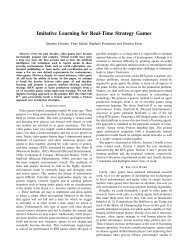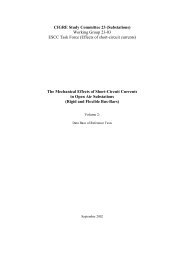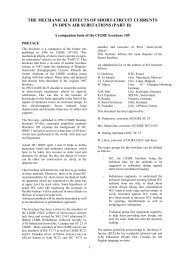Session 1 - Montefiore
Session 1 - Montefiore
Session 1 - Montefiore
You also want an ePaper? Increase the reach of your titles
YUMPU automatically turns print PDFs into web optimized ePapers that Google loves.
European regional forces generating urban sprawl<br />
with impacts beyond the control of urban managers<br />
at the local level. For these reasons, policies at<br />
all levels need to have an urban dimension that<br />
tackles urban sprawl and helps to redress market<br />
failures that drive urban sprawl and undermine a<br />
sustainable vision for the spatial planning of urban<br />
Europe.<br />
The EU white paper on European governance<br />
provides the following framework of principles<br />
underpinning good governance that assists in<br />
defining a framework for intervention to counter<br />
sprawl at all levels:<br />
• Policy coherence: ensuring that policies are<br />
coherent and not sector-specific and that<br />
decisions taken at regional and local levels are<br />
coherent with a broader set of principles;<br />
• Responsiveness to local conditions: flexibility in<br />
the means provided for implementing legislation<br />
and programmes with a strong territorial<br />
impact;<br />
• Cooperation in policy development:<br />
development of systematic dialogue and<br />
increased cooperation with European and<br />
national associations of regional and local<br />
government.<br />
5.4.1 Policy coherence<br />
Policy coherence provides the first principle of good<br />
governance through which the EU can support<br />
initiatives to counter urban sprawl. Cities can benefit<br />
from initiatives and programmes spanning the entire<br />
realm of European Commission competence; the<br />
framework for trilateral agreements between the EU,<br />
national governments and regional/local authorities<br />
(COM(2002)709) provides a specific example, and<br />
some agreements have already been signed, e.g.<br />
Milan (Laconte P., 2006).<br />
However, cities also need a long term sustainable<br />
policy vision to help synchronise the many<br />
critical success factors, including mobility, access<br />
to the natural environment, social and cultural<br />
opportunity, and employment, which all form the<br />
basis for sustainable urban development. At present,<br />
in many cases, the policy vision is poorly articulated<br />
permitting a market driven approach to dominate<br />
over the interests of sustainable development, a<br />
deficiency exacerbated by poor integration between<br />
the levels of governance. The EU can set the tone<br />
and direction for sectoral policy integration in cities<br />
whilst recognising that planning responses to the<br />
problem of sprawl must also be sensitive to the local<br />
and regional mix of priorities.<br />
Responses to urban sprawl<br />
As it stands, EU Cohesion Policy (2007–2013) offers<br />
an effective framework to build a coordinated<br />
and integrated approach to the sustainable<br />
development of urban and rural areas. The<br />
approach is essential to ameliorate the impacts of<br />
urban sprawl and specific actions include:<br />
• coordination of land use policies, as well as<br />
Structural and Cohesion Funds investments<br />
between urban areas, rural areas, the regions<br />
and the national levels to manage urban<br />
sprawl. Initiatives to make urban areas and city<br />
centres attractive places to live and support the<br />
containment of urban sprawl;<br />
• encouragement to Member States to explicitly<br />
delegate to cities funds addressing urban<br />
issues within Structural Funds operational<br />
programmes, with full responsibility<br />
throughout the process for the design and<br />
implementation of the delegated portion of the<br />
programme;<br />
• investments to achieve compliance with EU<br />
laws on air quality, waste-water treatment,<br />
waste management, water supply and<br />
environmental noise. Active management<br />
of congestion, transport demand and public<br />
transport networks, with a view to improving<br />
air quality, reducing noise and encouraging<br />
physical activity all of which can assist in<br />
addressing the sprawl of cities;<br />
• co-financing of activities under the Structural<br />
Funds based on plans that address the<br />
key challenges posed by sprawl and the<br />
improvement of the overall environmental<br />
quality of urban areas.<br />
5.4.2 Responsiveness to local conditions<br />
Responsiveness to local conditions provides the<br />
second principle of good governance through which<br />
the EU can support initiatives to counter urban<br />
sprawl. The principle emphasises the need for<br />
flexibility in the means provided for implementing<br />
EU legislation and programmes with a strong<br />
territorial impact.<br />
The EU Urban Thematic Strategy offers an umbrella<br />
framework to support actions and solutions<br />
developed at the local level to address urban<br />
management problems including urban sprawl.<br />
The strategy offers a coordinated and integrated<br />
approach to assist Member States and local and<br />
regional authorities to meet existing environmental<br />
obligations, to develop environmental management<br />
plans and sustainable urban transport plans, and<br />
so to reinforce the environment contribution to the<br />
sustainable development of urban areas.<br />
Urban sprawl in Europe 41






